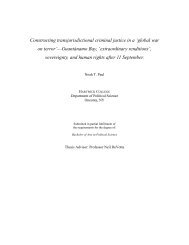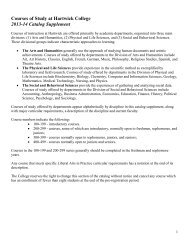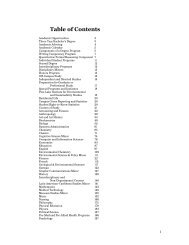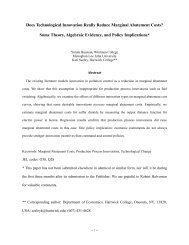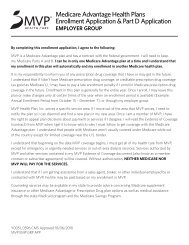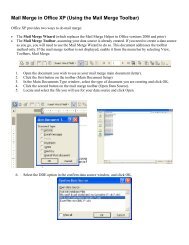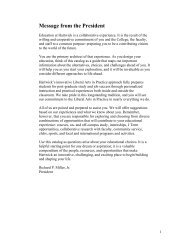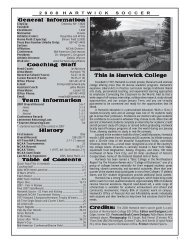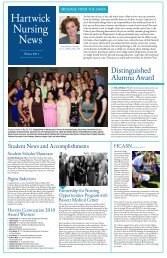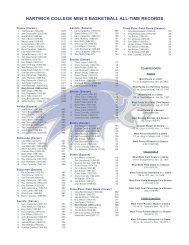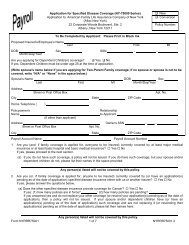Table of Contents - Hartwick College
Table of Contents - Hartwick College
Table of Contents - Hartwick College
Create successful ePaper yourself
Turn your PDF publications into a flip-book with our unique Google optimized e-Paper software.
emphasized in laboratory experiments include refraction, lenses and lens<br />
systems, interference, Fresnel and Fraunh<strong>of</strong>er diffraction, polarization,<br />
and quantum optics. Prerequisites: Phys 201, 202. Offered alternate<br />
years. (LAB)<br />
361, 362 Classical Mechanics (3 credits), (3 one-hour lectures weekly)<br />
A study <strong>of</strong> the kinematics and dynamics <strong>of</strong> bodies in motion. The first<br />
term is a study <strong>of</strong> Newtonian mechanics. Topics include the harmonic<br />
oscillator, central forces and gravitation. The second term includes<br />
Lagrangian dynamics, small oscillations, and the inertia tensor.<br />
Prerequisites: Phys 201 and Math 311. Offered alternate years.<br />
401, 402 Electricity and Magnetism (3 credits), (3 one-hour lectures<br />
weekly) A detailed study <strong>of</strong> the principles <strong>of</strong> electricity and magnetism.<br />
During the first term topics include electrostatics, dielectrics, electric<br />
currents, magnetic fields, and electromagnetic induction. Topics covered<br />
during the second term include the magnetic properties <strong>of</strong> matter,<br />
plasmas, Maxwell’s equations, and electrodynamics. Prerequisites: Phys<br />
201, 202, and Math 311. Offered alternate years.<br />
410 Quantum Mechanics (3 credits), (3 one-hour lectures weekly)<br />
Basic postulates <strong>of</strong> quantum mechanics and their physical meaning.<br />
Topics include potential wells and barriers, the harmonic oscillator, the<br />
hydrogen atom, electron spin and perturbation theory. Prerequisites:<br />
Phys 201, 202, 305 and Math 311. Offered alternate years.<br />
490 Senior Project (3 credits) Experimental or theoretical research<br />
project. Students work on a project <strong>of</strong> their choice under supervision <strong>of</strong> a<br />
faculty member. The results <strong>of</strong> the work are presented to the department<br />
in both written and oral form.<br />
Physics<br />
Requirements for the major: Minimum <strong>of</strong> 15* courses in physics,<br />
chemistry and mathematics, distributed as follows:<br />
Nine courses in physics:<br />
160 Light and Relativity<br />
201, 202 General Physics I, II<br />
265 Electronics<br />
305 Atomic and Nuclear Physics<br />
314 Thermodynamics and Statistical Physics or 318 Optics<br />
361 Classical Mechanics I<br />
410 Quantum Mechanics<br />
490 Senior Project<br />
Four courses in mathematics:<br />
121 Single Variable Calculus<br />
235 Advanced Single Variable Calculus<br />
233 Multivariable Calculus<br />
311 Differential Equations (Math)<br />
Two courses in chemistry:<br />
107, 108 General Chemistry I, II (Chem) or<br />
109 Accelerated General Chemistry (Chem)<br />
Recommended for freshmen interested in using the<br />
observatory:<br />
163 General Astronomy<br />
202



